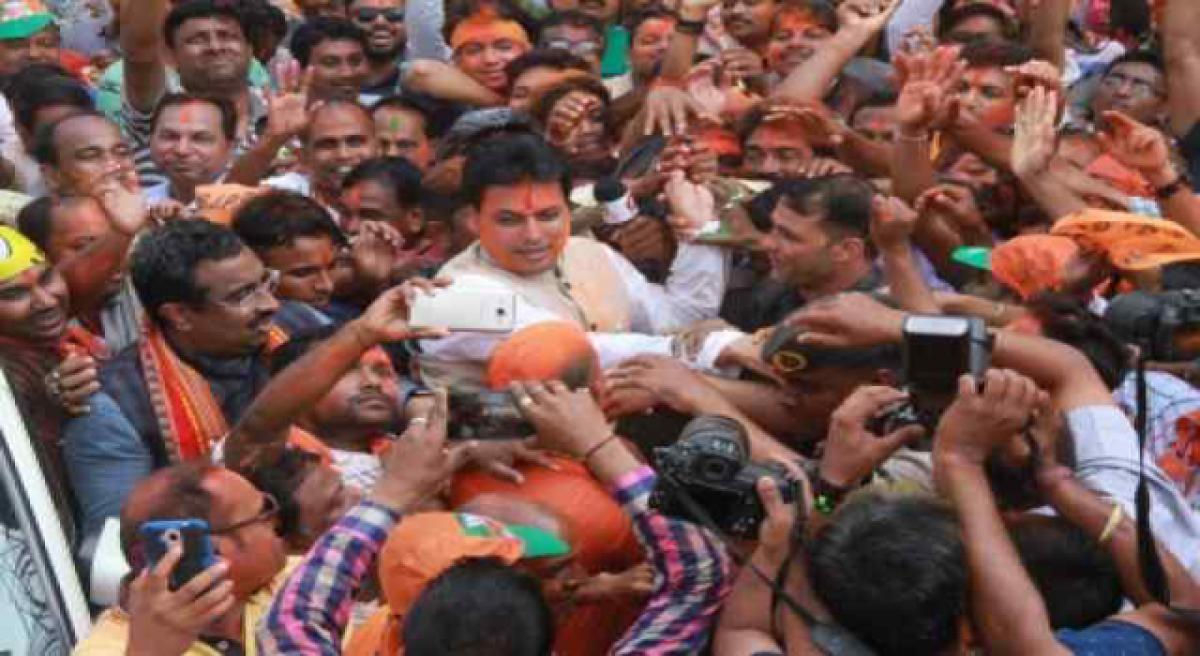Live
- Black Friday 2024: Top Gadget Deals You Can’t Miss – iPhone 16 for Rs 72,900 and More
- Some politicians attempting to divide Hindus for votebank: Former UP Minister
- Bangladesh's Deposed PM Sheikh Hasina Condemns Arrest of Hindu Leader Chinmoy Krishna Das, Demands Immediate Release
- Telangana DGE Revises SSC Exam Fee Payment Schedule for 2025
- ESA Proba-3 Mission Launch on ISRO's PSLV-XL Rocket: December 4, 2024
- MP Priyanka’s debut: Posts featuring Rahul, Kharge win hearts on social media
- 2025 Bollywood Movie Release Dates: Shahid Kapoor’s Deva in January to Alia Bhatt’s Alpha in December
- Shivraj Chouhan tells officials to ensure farmers get high quality fertilisers, seeds and pesticides
- Preamble of Constitution describes India’s collective spirit: Gopalkrishna Gandhi at Constitution Day lecture at JGU
- Centre to offload 25 lakh tonnes of wheat in open market to bring down price
Just In

Prima facie, it can seem that the Bharatiya Janata Party (BJP) has been able to achieve its objective of ushering in a Congress-mukt India in the northeast, especially in Tripura, by being in a position to come to power in at least two of the three states which went to the polls last month.
Prima facie, it can seem that the Bharatiya Janata Party (BJP) has been able to achieve its objective of ushering in a Congress-mukt India in the northeast, especially in Tripura, by being in a position to come to power in at least two of the three states which went to the polls last month.
However, such a conclusion will be facile. The reason is that in Tripura, for instance, the BJP has succeeded in coopting virtually all the entire 30-plus per cent support base of the Congress.
As a result, it can be said that the BJP in Tripura at present is really the Congress by another name. True, there will be elements in the party who are ideologically close to the BJP, mostly as a result of the groundwork done by the Rashtriya Swayamsevak Sangh (RSS) in the state.
But their numbers cannot be large. It is not easy to pinpoint what is behind the wholesale transfer of the Congress base to the BJP. The BJP's seemingly limitless resources have been mentioned in this context. But the main explanation apparently lies in the continuing popular belief in Prime Minister Narendra Modi's promise of development.
One reason why it hasn't is the failure of the Communist Party of India-Marxist (CPI-M) to perceptively boost Tripura's economy. Similar inabilities of the governments in the two other states -- Meghalaya and Nagaland -- undoubtedly played a role in undermining the prospects of the ruling parties.
What the turn in the BJP's favour means is that the party has been able to overcome to a very large extent the disadvantages posed by its image as a party of Hindu chauvinists which will impose its fetishes about not eating beef and pursue its policies denigrating Christian missionaries by effectively playing its "sabkasaath, sabkavikas" or development for all card.
Considering that the northeast has always lagged behind the rest of the country where infrastructure and economic growth are considered, the possibility of vikas with the added advantage of the new rulers in the states being able to act in sync with the centre evidently had an irresistible appeal.
This attraction could not but be boosted by the anti-incumbency factor in a state like Tripura where the CPI-M has been in power for the last quarter of a century. It is no longer enough for a chief minister to gain votes by being the "poorest" person to hold the position, as Manik Sarkar did.
The ideology of "simple living and high thinking" which used to attract the ordinary people to communism has been eroded, first, by the not-so-abstemious lifestyle of some of the comrades and, secondly, by a sluggish economy. Any promise, therefore, of rapid material advancement pays political dividends.
Sarkar may have also paid the price of being a follower of the Prakash Karat-line of the CPI-M's politics which refuses to align with the Congress to fight the BJP. It appears, therefore, that the Marxists in Tripura did not take the challenge posed by the BJP seriously enough and continued to regard the Congress as the main adversary even if it was fading away. Had the party been able to focus more aggressively on what it sees as the BJP's politics of communal polarization, it might have been to save its last remaining bastion.
What the outcome points to is the need for a party to constantly reinvent itself. The CPI-M failed to do so, sticking instead to an ideology which died with the collapse of the Soviet Union. Neither did the Congress, which was seemingly clueless about its members fleeing in droves to the Trinamool Congress and the CPI-M. It also did not pay enough attention to the region with Rahul Gandhi failing to match the energetic campaigning of Modi and Amit Shah.
In contrast, the BJP provides an excellent example of donning a new garb because it has been able to develop opportunism to a fine art. For one, it has no compunctions about gobbling up an entire party to win.
Although such an act of absorption does not speak well of a party which has thus been swallowed, it shows that the BJP will stop at nothing to go past the winning line without any thought to whether its act will cause indigestion. The BJP evidently believes in living in the present.
For another, the BJP has no hesitation about dispensing with its reservations about beef in order to get the parties in Meghalaya and Nagaland on board, confirming what Asaduddin Owaisi said about the cow being "mummy" in north India, but yummy in North East.
By Amulya Ganguli

© 2024 Hyderabad Media House Limited/The Hans India. All rights reserved. Powered by hocalwire.com







